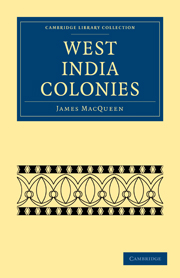Summary
IN his enumeration of the benefits and advantages which African Slaves derived from emancipation, Mr. Clarkson has inadvertantly forgotten Cayenne. In 1799, the French Directory directed Victor Hugues to emancipate the Slaves in that colony. Their number then was about 11,000. Between 4000 and 5000 only, were persuaded to remain on the plantations, and work as hired labourers. But they worked only by fits and starts, and the planter had no security in their labour for taking off his crop. When any of them fell sick they were left to live or die, as might happen; medical men, having no longer any security for payment for their labour and skill, left the colony. The majority became gamblers, (40 billiard tables were set up), drunkards, thieves, and robbers. A strong garrison, however, kept them in nominal subjection. At the end of two years the French Consular Government directed them to be reduced to their former servile state. Their number was mustered and found to be only 8,700, having decreased 2,300 in two years by their own profligacy. Such were the effects of sudden emancipation in Cayenne, without either convulsion or bloodshed.
The same disastrous results, were seen in the island of Grenada, during the period that rebellion was successful. All labour and cultivation were abandoned by the Slaves, who burnt down all the Sugar works, that they might not be called upon to labour any more. In Guadaloupe, also, under the sway of liberty and equality, and of Victor Hugues—the emancipated negroes relinquished labour and cultivation, and became idle, dissolute, and profligate, in the extreme;—a nest of robbers and pirates.
- Type
- Chapter
- Information
- West India Colonies , pp. 210 - 219Publisher: Cambridge University PressPrint publication year: 2010First published in: 1824



